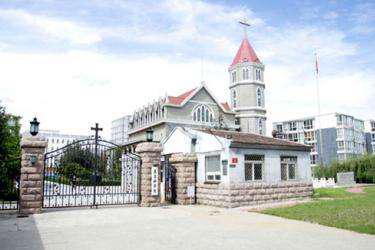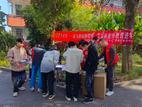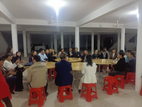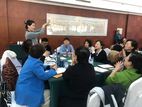Yanjing Theological Seminary is an important theological education institution that serves churches in northern and northwest China. Since 1986 it has trained many pastors and contributed greatly to the development of the Chinese church.
The origins of Yanjing Theological Seminary are in Peking University, which was founded by Leighton Stuart in 1916. As a Christian school, Peking University established the College of Divinity, which was renamed "School of Religion of Peking University" in 1925. At that time, the religion department of Peking University was full of famous teachers. Zhao Zichen, Liu Tingfang and Wu Leichuan, the famous "three masters of Peking University," all taught in the School of Religion at Peking University during that period.
In early 1950, the School of Religion School was separated from the university and became an independent school. In the 1950s, Yanjing School of Religion merged with many domestic seminaries.
According to the record: "In April 1953, Beijing Theological Seminary, North China United Women's Shengdao College and Peking Bible Seminary were merged into the Yanjing School of Religion and Peking Union Theological Seminary was formed.
In September 1953, Shenyang Northeast Theological Seminary, Henan Kaifeng Baptist Huanei Theological Seminary, and Holy Church Bible College joined the Peking Union Theological Seminary. Later on, Hubei Shekou Lutheran Theological Seminary, Changsha Bible College, The Assemblies of God Aletheia College and Beijing Xiangshan Spiritual School also were merged into Peking Union Theological Seminary."
In 1961, the second national conference of Chinese Christianity adopted a resolution to merge the Peking Union Theological Seminary with the Nanjing Jinling Union Theological Seminary. The teaching staff in Peking was divided into two parts: one part went south to Nanjing to teach, while the other part set up the Beijing Research Office of Jinling Union Theological Seminary in Beijing.
After the reform and opening-up policy was introduced and new religious policies were implemented, theological education developed rapidly in China. In 1983, Beijing Theological Seminary was established by Beijing Christian Council & Three-self Patriotic Movement, and Tianjin Theological Seminary was established by the churches in Tianjin in the following year. In June 1986, the Three-Self Committee in Hebei, Shanxi, Inner Mongolia, Shaanxi, Gansu, Ningxia, Qinghai, Xinjiang, Beijing and Tianjin jointly established the Yanjing Theological Seminary, with Beijing Theological Seminary and Tianjin Theological Seminary merged into one school. The school was originally located at No. 43, Dongdan North Street, Beijing. In the autumn of 1992, after much consultation, the decision was made to build a new campus in Qinghe Town, Haidian District, Beijing. The new campus covers an area of 30 mu.
At present, Yanjing Theological Seminary has made remarkable achievements in developing academic disciplines, cultivating talented individuals, building a faculty, establishing pedagogy and research disciplines and constructing a library. Currently, there are 22 full-time teachers, including three persons with doctorates who have studied abroad, 11 with MA degrees who have been trained at home and abroad, and four persons who are studying abroad. This has laid the foundation for Yanjing Theological Seminary to become a first-class Christian college in China.
Yanjing Theological Seminary established the Qinghe church, which was completed on November 2, 2004. In the process of the construction of Yanjing Theological Seminary, there has been no lack of love and dedication from Christians and churches at home and abroad, supporting the seminary with no conditions attached. Mr. Huang Guangpu, a patriotic Chinese American, is a devout Christian who graduated from Peking University before moving to the United States. He contributed half a million dollars to the construction of the church of Yanjing Theological Seminary without asking anything in return. This contribution was of great help in the church’s construction.
The architecture of the Qinghe church at Yanjing Theological Seminary is designed to mimic the Beijing Congregational Church in Dengshikou, only on a smaller scale. This reflects the historical inheritance of famous churches in Beijing and the new look of Christianity in contemporary China.
- Translated by Nicolas Cao












